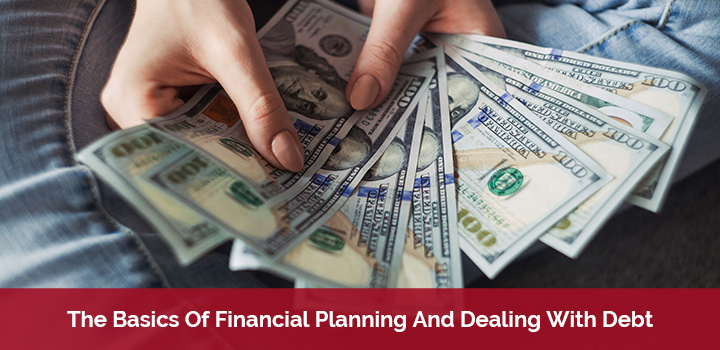
As a bankruptcy attorney, I am used to counseling individuals and families who are struggling with debt. But what I still cannot get used to seeing is how well-meaning people, who want to do what they can to pay off their debts, end up making their debt problems much worse by using incorrect debt management methods. And this is almost always avoidable.
I’ll give you a few examples. Say you have $20,000 in credit card debt. You can’t afford to pay this debt and pay your other bills, and the credit card company keeps calling you, and possibly even threatening to sue you. You know you have some equity in your home, so you decide to refinance your home, or take out a home equity line of credit, to pay off the credit cards. Your credit cards are now paid off, but your mortgage payments have gone up. If you weren’t able to make your credit card payments, you are likely to have difficulty making the increased mortgage payments as well. You start falling behind on your mortgage, and the mortgage company starts foreclosure proceedings. You are now in danger of losing your home.
Or, as often happens, you get so inundated with the credit card company’s collection calls and letters, that you are willing to pay them just to make it stop. So you skip a mortgage or car payment to pay the credit card company, hoping that you’ll catch up later. If you can’t catch up, or fall even further behind, you now stand to lose your house or car. And because of accruing interest, you probably still owe the credit card company as much as you did to begin with.
Yet another possibility is that you pull money out of your retirement account or 401(k) to pay off your credit cards. However, unless the situation that caused the debt in the first place has been remedied, the same type of scenario is likely to be repeated. Eventually, you deplete your retirement account, but still have debt to deal with.
Dealing With Debt
So, what should you do? Well, when dealing with debt problems, there are a few simple rules that you can follow to make sure you do not make your situation any worse than it is. First, you must properly prioritize your obligations. Put simply, there are certain bills that you need to pay before paying other bills. The basic order is as follows: 1) pay your living expenses—being current on your mortgage or having a low credit card balance is not that helpful when you are going hungry or don’t have electricity, so make sure to take care first of the necessities; 2) after your living expenses are covered, pay your secured debts, like a mortgage or car payment—not paying a secured debt may result in the loss of the collateral (i.e. the house or the car), so secured debts should take priority over unsecured debts like credit cards; 3) pay unsecured debts, like credit cards or personal loans, only if you have money left over after paying your living expenses and secured debts.
Second, you want to protect your exempt assets. Exempt assets are those that your unsecured creditors cannot touch, regardless of how much you owe them. What assets are exempt varies from state to state. Arizona law provides many different exemptions, including an exemption for your car and an exemption for many items of your household goods and furniture. However, most people’s biggest exempt asset is a retirement or 401(k) account (although a house in which a person lives can also be claimed exempt, in most cases the house will be encumbered by a mortgage). If you are struggling with debt, there is a natural tendency to want to use your retirement account or other exempt assets to pay down the debt. Unfortunately, oftentimes this tactic will not resolve your debt problems but only prolong them. Ultimately, you may still end up having to seek debt relief through bankruptcy, but if you deplete your exempt assets before filing for bankruptcy, you will make your road to financial recovery that much more difficult.
Third, do not incur secured debt to pay off unsecured debt. Secured debt is debt that, if not paid, will result in the loss of the collateral that you pledged to secure the debt. On the other hand, unsecured debt, if not paid, does not automatically result in the loss of any property. More importantly, unsecured debt is dischargeable in bankruptcy. So, to use the example from earlier in this article, if you take out a home equity line of credit (“HELOC”) to pay off a credit card, you have converted what was an unsecured debt (credit card) into a secured debt (home equity loan). If you had difficulty paying the credit card, you will probably have difficulty paying the HELOC. But now that the debt is secured, if you are unable to pay it, you are likely to lose the property securing the debt, i.e. your home in our example. In addition, if you end up seeking debt relief through bankruptcy, you can, with some exceptions, eliminate unsecured debt. However, in most cases, you cannot eliminate secured debt unless you are willing to get rid of the property securing the debt.
To summarize, although financial problems are often a result of many different factors, proper planning and debt management will help you maintain control of your situation, and will give you greater flexibility in resolving your financial difficulties and getting your life back on track. Just remember to prioritize your obligations, protect your exempt assets, and not convert unsecured debt into secured debt. For more information on dealing with debt, you can read our article on ways to avoid bankruptcy in Arizona. For more information in dealing with debt through bankruptcy, read 7 Mistakes to Avoid When Filing for Bankruptcy in Arizona and Bankruptcy Myths and Misconceptions.

